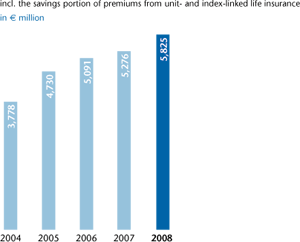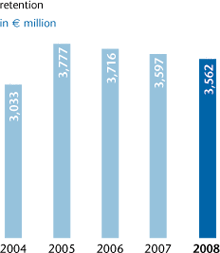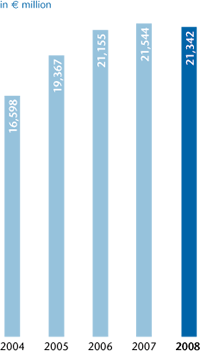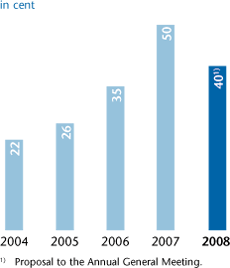| | Group business developmentBusiness linesThe UNIQA Group provides life and health insurance and is active in almost
all lines of property and casualty insurance. With almost 15 million insurance
policies under management at home and abroad, a gross premium
volume written (including the savings portion of the unit- and index-linked
life insurance) of €5.8 billion (2007: €5.3 billion) and capital investments
of more than €21.3 billion (2007: €21.5 billion), the UNIQA Group is one
of the leading insurance groups in Central and Eastern Europe. Premium development
Premium volume written |

|
Taking the savings portion of the unit- and index-linked life insurance in
the amount of €823 million (2007: €748 million) into account, the total
premium volume of the UNIQA Group grew in 2008 by 10.4% to €5,825
million (2007: €5,276 million). The total consolidated premiums written
in 2008 grew by 10.5% to €5,002 million (2007: €4,528 million). Both
the area of recurring premium insurance with a growth of 6.7% to €4,912
million (2007: €4,602 million) as well as the single premium business with
a growth of 35.7% to €913 million (2007: €673 million) developed very
satisfactorily in 2008. The Group premiums earned including the savings
portion of the unit- and index-linked life insurance (after reinsurance) in the
amount of €774 million (2007: €695 million) rose by 14.6% to €5,504
million (2007: €4,801 million). The retained premiums earned (according
to IFRS) increased by 15.2% to €4,730 million (2007: €4,106 million).
In the 2008 financial year, 41.2% (2007: 41.7%) of the premium volume
arose in property and casualty insurance, 16.3% (2007: 17.2%) in health
insurance and 42.5% (2007: 41.1%) in life insurance.
In Austria, the premium volume written including the savings portion of
unit- and index-linked life insurance increased in 2008 by 2.3% to €3,599
million (2007: €3,517 million). Including the savings portion of unit- and
index-linked life insurance, the premiums earned rose by 6.4% to €3,457
million (2007: €3,249 million). The retained premiums earned (according
to IFRS) in Austria amounted to €2,971 million in 2008 (2007: €2,885
million).
In the regions of Eastern and South Eastern Europe (CEE & EEM), the
premiums
grew significantly faster in 2008. The premium volume written
including the savings portion of unit- and index-linked life insurance
increased
in 2008 by 56.7% to €1,279 million (2007: €816 million). This
put the share of Group premiums coming from CEE & EEM at 22.0%
(2007: 15.5%). Including the savings portion of the unit- and index-linked
life insurance, the premiums earned rose by 56.4% to €1,188 million
(2007: €760 million). The retained premiums earned (according to IFRS)
grew by 71.1% to €1,073 million (2007: €627 million).
In the Western European countries (WEM) the premium volume written
rose only slightly in 2008 by 0.5% to €947 million (2007: €942 million).
On the other hand, recurring premiums developed positively and grew by
1.8% to €700 million (2007: €688 million). Overall, the share in Group
premiums therefore fell somewhat in 2008 to 16.3% (2007: 17.9%).
Including the savings portion of the unit- and index-linked life insurance,
the premiums
earned increased by 8.4% to €860 million (2007: €793
million).
The retained premiums earned (according to IFRS) rose by 15.5%
to €686 million (2007: €594 million). Developments in insurance benefits
Insurance benefits |

|
The insurance benefits paid by the UNIQA Group (before reinsurance)
decreased
again in the 2008 financial year by 4.8% to €3,704 million
(2007: €3,892 million). The consolidated retained insurance benefits also
declined last year by 1.0% to €3,562 million (2007: €3,597 million).
While the insurance benefits paid in 2008 in Austria decreased by 16.5%
to €2,287 million (2007: €2,739 million), they increased in the Western
European markets by 7.0% to €528 million (2007: €493 million). In the
Central and Eastern European regions (CEE & EEM) as well, the insurance
benefits increased due to the rapid premium growth by 104.6% to €746
million (2007: €365 million).
Operating expensesTotal consolidated operating expenses (cf. Group notes, No. 37) less reinsurance commissions and profit shares from reinsurance business ceded (cf. Group notes, No. 33) increased in financial year 2008 by 17.2% to €1,237 million (2007: €1,056 million). Acquisition expenses before the change in deferred acquisition costs rose by 6.7% to €866 million (2007: €812 million). Taking into account the change in deferred acquisition costs, which represented an additional expense of €22 million in 2008 compared to the previous year, the acquisition expenses grew by 9.6% to €870 million (2007: €794 million). Other operating expenses, excluding reinsurance commissions received, increased to €368 million (2007: €262 million) since the reinsurance commissions received were lower by €52 million due to the change in the reinsurance structure in 2008 and the associated higher retention ratios.
The cost ratio of the UNIQA Group after reinsurance, i.e. the relation of total operating expenses to the Group premiums earned, including the savings portion of the unit- and index-linked life insurance, was 22.5% during the past year (2007: 22.0%) due to the developments described above. Adjusted for the change in deferred acquisition costs, the cost ratio in 2008 remained unchanged at 22.4% (2007: 22.4%). The cost ratio before reinsurance amounted to 21.7% (2007: 21.5%). Investment results
Investments |

|
Total investments including land and buildings used by the Group, real
estate
held as investments, shares in associates and investments of unit- and
index-linked life insurance decreased slightly in 2008 by 0.9% to €21,342
million (2007: €21,544 million).
Net income from investments less financing costs sank by 80.2% to
€189 million (2007: €955 million) as a result of the global financial crisis.
However, the investment results of the year 2007 had been positively
influenced
by the exceptional amount of €177 million from the two capital
increases of STRABAG SE.
A detailed description of the investment income can be found in the Group
notes (cf. Group notes, No. 34).
Group pre-tax results at €90 million
Dividend |

|
In the 2008 financial year, the profit on ordinary activities of the UNIQA
Group fell by 73.5% primarily due to the heavily declining revenues from
investments to reach €90 million (2007: €340 million). Adjusted for the
special effect from the stake in STRABAG SE in the year 2007, the pre-tax
results only exhibit a decline of 44.9% from €163 million to €90 million.
Despite this development, the Management Board will recommend to
the Supervisory Board and the Annual General Meeting the payout of a
dividend
of 40 cents per share. Own funds and total assetsDespite the effects of the financial crisis, the UNIQA Group’s total equity
declined only slightly in 2008 by €73 million to €1,459 million (31 Dec.
2007: €1,532 million). This included shares in other companies amounting
to €194 million (31 Dec. 2007: €196 million). The pre-tax return on
equity – the ratio of profit on ordinary activities to average total equity
(without taking into consideration the included net profit for 2008) –
amounted to 6.1% in the past financial year (2007: 26.2%). The total assets
of the Group increased slightly in the past financial year by €41 million
and totalled
€25,630 million on 31 December 2008 (31 Dec. 2007:
€25,589 million). Cash flowThe cash flow from operating activities in 2008 was €267 million (2007:
€846 million). Cash flow from investing activities of the UNIQA Group
amounted to €–484 million (2007: €–510 million). Due to the capital
increase
performed in 2008, the financing cash flow stood at €125 million
(2007: €51 million). A total of €60 million were spent on the dividends
from the 2007 financial year. The amount of liquid funds changed in total
by €–79 million (2007: €384 million). At the end of 2008, funds amounting
to €568 million (2007: €647 million) were available. EmployeesThe average number of employees in the UNIQA Group increased in 2008
through inclusion for the first time of the companies in Romania, the
Ukraine and Serbia, bringing the total to 13,674 (2007: 10,997). Of these,
6,269 (2007: 4,273) were employed in sales and 7,405 (2007: 6,724) in
administration. In the Eastern Emerging Markets (EEM), UNIQA employed
a staff of 3,718 in 2008 (2007: 864), 2,954 people (2007: 2,987) in Central
Eastern Europe (CEE) and 986 (2007: 982) in the Western European markets
(WEM). In Austria, 6,016 staff were employed (2007: 6,164). Including
the employees of the general agencies working exclusively for UNIQA,
the total staff of the UNIQA Group amounts to over 19,000 (2007: 15,800)
people.
51% of the administrative staff employed in Austria in 2008 were women,
18.5% (2007: 18.2%) of the employees were part-time. The average
age in the past year remained 42 years (2007: 42 years). In total, 11.3%
(2007: 10.5%) of the employees participated as managers in UNIQA’s
result-oriented
remuneration system – a variable payment system that is
tied both to the success of the company and to personal performance.
In addition, the UNIQA apprentice exchange programme offers young
people
in training the opportunity to get to know foreign cultures and
make international contacts. |
| | |


 Group Management Report
Group Management Report Group business development
Group business development









 Contact
Contact


